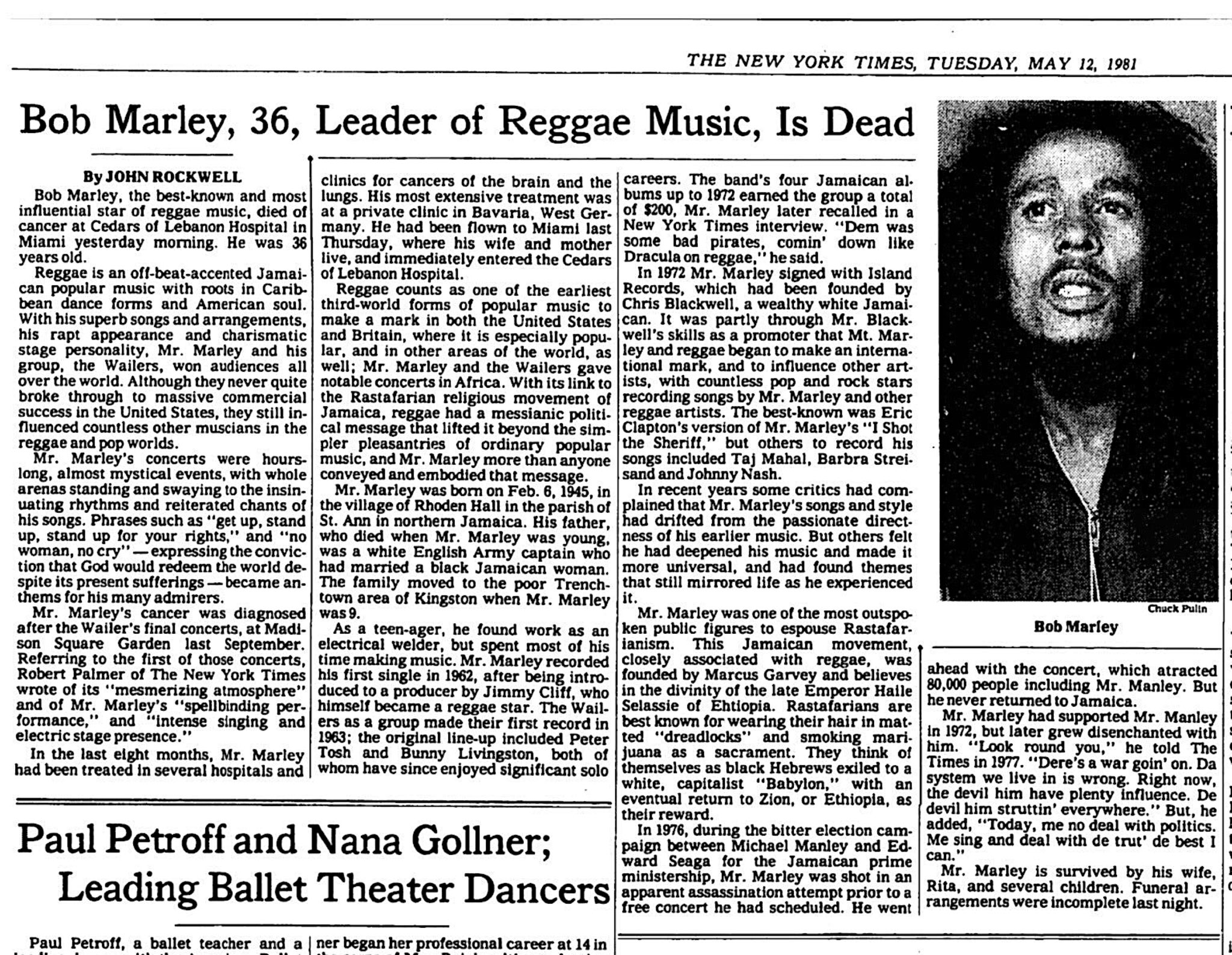Reason For Bob Marley's Death: A Deep Dive Into The Legend's Final Days
Bob Marley’s name is synonymous with reggae music, peace, love, and unity. But behind the iconic musician’s legendary career lies a tragic story that many still wonder about—the reason for Bob Marley’s death. His untimely passing shocked the world, leaving fans in disbelief. Today, we’ll uncover the truth behind what really happened and explore the medical, emotional, and spiritual aspects surrounding his final days.
When people think of Bob Marley, they picture a man who radiated positivity, someone who used his voice to inspire millions around the globe. Yet, the same man who sang about redemption and hope also faced one of the darkest battles of his life—a battle against cancer. The reason for Bob Marley’s death wasn’t just a medical issue; it was a combination of circumstances that ultimately led to his demise.
This article isn’t just about Bob Marley’s death; it’s about understanding the man behind the legend. We’ll dive deep into his medical condition, the choices he made, and the legacy he left behind. So, buckle up because this journey will take you through the highs and lows of one of the most influential figures in music history.
Read also:Four Girls One Fingerprint The Untold Story Of Female Bonding Mystery And Identity
Table of Contents
- Bob Marley's Biography
- The Cause of Death
- Medical Background
- How the Cancer Was Diagnosed
- Treatment Options and Bob’s Choices
- Spiritual Beliefs and Their Role
- Final Days
- Impact on His Legacy
- Prevention and Lessons Learned
- Conclusion
Bob Marley's Biography
Before we delve into the reason for Bob Marley’s death, let’s take a moment to understand the man himself. Bob Marley, born on February 6, 1945, in Nine Mile, Jamaica, was more than just a musician. He was a cultural icon who brought reggae music to the world stage. His songs were anthems of resistance, love, and hope, and they continue to resonate with people from all walks of life.
Data and Facts
| Full Name | Robert Nesta Marley |
|---|---|
| Birth Date | February 6, 1945 |
| Place of Birth | Nine Mile, Jamaica |
| Death Date | May 11, 1981 |
| Place of Death | Miami, Florida, USA |
Bob’s journey from a small village in Jamaica to international fame is nothing short of remarkable. But as his star rose, so did the challenges he faced—both personally and professionally. His death remains a poignant reminder of the fragility of life, even for those who seem invincible.
The Cause of Death
Now, here’s the part you’ve been waiting for—the reason for Bob Marley’s death. Officially, Bob Marley passed away due to complications from acral lentiginous melanoma, a rare form of skin cancer. This aggressive cancer initially appeared as a small wound on his toe, which he sustained during a soccer game in 1977. Little did he know that this seemingly minor injury would spiral into something far more serious.
Melanoma is a type of skin cancer that can spread quickly if left untreated. In Bob’s case, the cancer metastasized to other parts of his body, including his brain, lungs, and liver. Despite his initial reluctance to seek treatment, the disease eventually overwhelmed him, leading to his untimely death at the age of 36.
Medical Background
Bob Marley’s medical history is crucial in understanding why his cancer progressed so rapidly. Acral lentiginous melanoma is particularly dangerous because it often goes undetected until it’s too late. Unlike other forms of skin cancer, it typically occurs on areas of the body that aren’t exposed to sunlight, such as the soles of the feet or palms of the hands.
Symptoms and Diagnosis
Initially, Bob dismissed the wound on his toe as a minor injury. However, when the wound refused to heal and began to worsen, concerns were raised. Doctors soon diagnosed him with melanoma, a diagnosis that would change the course of his life forever.
Read also:Who Is Michael Consuelos Boyfriend The Untold Story Behind The Scenes
- Dark or discolored patches on the skin
- Persistent sores that don’t heal
- Changes in the size, shape, or color of a mole
Unfortunately, by the time the cancer was diagnosed, it had already begun to spread. This delayed detection played a significant role in Bob’s tragic outcome.
How the Cancer Was Diagnosed
The diagnosis of melanoma came after a series of tests and examinations. Initially, doctors suggested amputating Bob’s toe to prevent the cancer from spreading. However, Bob refused, citing his Rastafarian beliefs and his desire to continue performing barefoot. This decision, while understandable given his spiritual convictions, ultimately contributed to the cancer’s progression.
Modern medicine has come a long way since then, and early detection of melanoma can significantly improve survival rates. Bob’s story serves as a cautionary tale about the importance of seeking medical attention promptly and considering all treatment options.
Treatment Options and Bob’s Choices
Once the cancer was diagnosed, Bob had several treatment options available to him. These included surgery, chemotherapy, and radiation therapy. However, Bob chose a more holistic approach, relying on natural remedies and alternative treatments. While his faith in these methods was strong, they were not enough to stop the aggressive nature of the cancer.
It’s important to note that Bob’s decision wasn’t made lightly. His Rastafarian beliefs emphasized living in harmony with nature and rejecting conventional Western medicine. This belief system shaped his approach to treatment, even in the face of a life-threatening illness.
Spiritual Beliefs and Their Role
Bob Marley’s spiritual beliefs were deeply intertwined with his music and his life. As a devout Rastafarian, he viewed illness as a test of faith and a call to live in accordance with natural laws. This perspective influenced his decision to pursue alternative treatments and avoid traditional medical interventions.
Rastafarianism emphasizes the importance of spiritual healing and the use of natural remedies. While these practices can be beneficial in some cases, they aren’t always effective against aggressive diseases like melanoma. Bob’s commitment to his beliefs was unwavering, even as his health deteriorated.
Final Days
Bob Marley’s final days were filled with pain and suffering, but he remained true to his beliefs until the end. In April 1981, as his condition worsened, he was flown from Germany to Jamaica for treatment. However, he never made it home. Bob passed away in a hospital in Miami on May 11, 1981, leaving behind a legacy that continues to inspire millions.
His funeral was a grand affair, attended by thousands of mourners from around the world. Bob was laid to rest in his birthplace, Nine Mile, Jamaica, where he remains a symbol of hope and resilience to this day.
Impact on His Legacy
Bob Marley’s death didn’t diminish his legacy; if anything, it amplified it. His music continues to resonate with people across the globe, spreading messages of love, peace, and unity. The reason for Bob Marley’s death serves as a reminder of the importance of early detection and prompt medical attention, especially when it comes to serious illnesses like cancer.
His influence extends beyond music. Bob’s life and work have inspired countless individuals to embrace their culture, stand up for their beliefs, and strive for a better world. His legacy lives on through the Bob Marley Foundation, which supports education, healthcare, and community development initiatives worldwide.
Prevention and Lessons Learned
Bob Marley’s story is a powerful reminder of the importance of prevention and early detection. Melanoma, while aggressive, is often treatable if caught early. Regular skin checks, awareness of risk factors, and prompt medical attention can make all the difference.
Here are a few key takeaways from Bob’s story:
- Don’t ignore persistent wounds or changes in your skin
- Seek medical advice promptly if you notice anything unusual
- Consider all treatment options and consult with healthcare professionals
Bob’s legacy isn’t just about his music; it’s about the lessons we can learn from his life and death. By raising awareness about melanoma and other serious illnesses, we can honor his memory and ensure that his story continues to inspire future generations.
Conclusion
The reason for Bob Marley’s death was a tragic combination of circumstances that ultimately led to his untimely passing. While his decision to pursue alternative treatments was shaped by his spiritual beliefs, it also highlights the importance of balancing faith with modern medicine. Bob’s story serves as a powerful reminder of the need for early detection, prompt medical attention, and open-mindedness when it comes to treatment options.
As we reflect on Bob Marley’s life and legacy, let’s remember the lessons he taught us—not just through his music, but through his actions and choices. His story is one of resilience, faith, and unwavering commitment to his beliefs. Let’s honor his memory by spreading awareness and supporting causes that align with his vision of a better world.
So, what’s next? Share this article with your friends and family to spread awareness about melanoma and the importance of early detection. And don’t forget to explore more of Bob Marley’s music and the incredible legacy he left behind. Together, we can keep his spirit alive and inspire change for generations to come.


